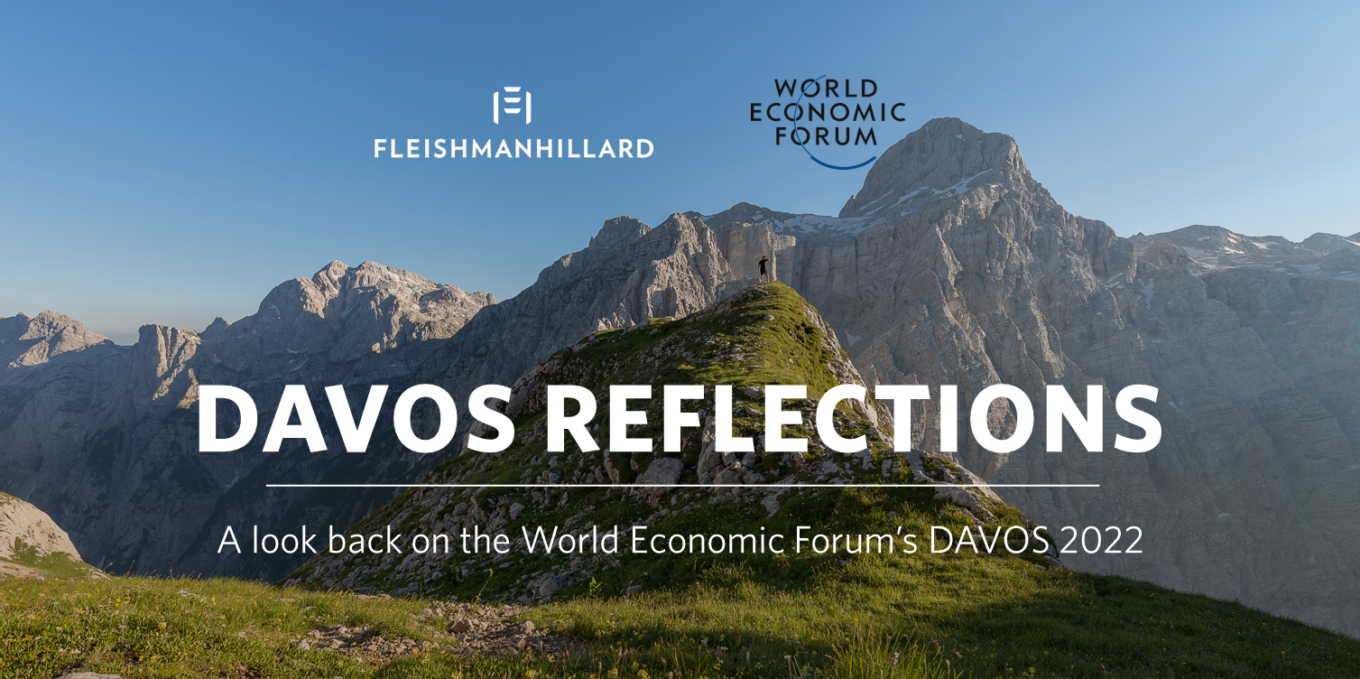Davos Reflections: A look back on the World Economic Forum’s DAVOS 2022

Last week saw the return of the World Economic Forum’s annual meeting in Davos – its first in two years.
It wasn’t just the January snow that was missing, with heads of state, A-list celebrities, and a sense of optimism also hard to find in the mountains of Switzerland. Hanging over the week’s discussions was a philosophical question: Does Davos still matter?
Given the goal of Davos is to provide a platform for leaders to discuss new ideas and innovations to build a more sustainable, inclusive, productive world, surely the challenges of 2022 would make it more important than ever. Yet commentators have said this Davos was markedly different from in years past, particularly given the dearth of heads of state and political leaders in attendance. They have challenged whether Davos is still relevant and effective.
Davos has faced this question for many years, so why does it feel more significant this year?
Reflecting on this question, we hear from Michael Hartt, senior partner and head of international affairs at FleishmanHillard UK and share an online conversation analysis from Caroline Wright and Aadam Ayub in our TRUE Global Intelligence team. (Spoiler alert, it’s pretty cynical out there. One of the most engaged tweets was from a young freelance journalist’s impressions of Day 1 at Davos: “I have already come to the conclusion that the world would be a better place if the WEF didn’t exist.” (Yikes!)
 With the Need for Action on Global Challenges, Can Davos Deliver? | Davos Reflections 2022
With the Need for Action on Global Challenges, Can Davos Deliver? | Davos Reflections 2022
Michael Hartt, Senior Partner and Head of International Affairs
The mood at Davos last week was unsurprisingly sombre, reflecting what Citigroup CEO Jane Fraser defined as the three R’s: “It’s Russia, it’s recession and it’s [interest] rates”. That’s not to mention the growing concerns about food security, unequal COVID-19 recovery, the climate crisis and risks presented by deglobalisation. With businesses facing such a complex, intertwined web of issues, can they have a positive impact?
Ukraine front and centre: First and foremost, this was a Davos of Ukraine. Russia was firmly disinvited, Ukraine’s President Zelenskyy delivered a much-anticipated virtual address, and wealthy figures like Victor Pinchuk funded a takeover of the Russia House to host an exhibition on war crimes by Russia.
Concern about the war’s impact on the global economy, and how businesses can and should respond, were constant topics of debate. Associated issues like the growing threat to food supply also defined many conversations. But there were no significant breakthroughs, even as President Zelenskyy urged companies to stop “all trade with the aggressor…so that your brands will not be associated with war crimes”. Some commentators couldn’t help noticing the irony of certain CEOs giving him a standing ovation while their companies still do business in Russia.
Uncertainty around China: Beyond Ukraine, China also weighed heavily on attendees’ minds. The country sent far fewer guests – only about 10 – and was the subject of scepticism for its COVID-19 lockdown measures, management of its economy and general retreat from global engagement. Some attendees noted the interest from business and investors has swung toward India, which marked 75 years of independence with a large presence at Davos.
Despite the handwringing, there is no sign that global business leaders’ concerns about China will trigger action by China to get supply chains moving and increase production in factories. Which prompts the question of whether Davos focused attention on the problem but made no progress in solving it.
Climate crisis takes a backseat: Just six months on from COP26, which featured more corporate engagement than any previous COP summit, action on the climate crisis was notably lacking at Davos. Leading voices from 2020 like Greta Thunberg were absent, while Alok Sharma, the UK’s COP26 head, maintained a low profile.
Business leaders generally avoided the topic, except in the context of rapidly rising energy prices that may affect the ability to invest in renewables. There was little discussion about the urgent need for carbon reduction and climate adaptation measures, particularly for lower and middle-income countries that are part of many companies’ supply chains. Said one former UK Cabinet Minister, “it has become ridiculous. You have executives flying to Switzerland in private jets, then pledging to plant millions of trees as a carbon offset.”
So what does it all mean?
At a time when geopolitics, global economic pressures and other forces present more risk than in many years, there is little sense that business leaders cracked the code at Davos.
Instead, they may be more at the mercy of forces out of their control than in years past – from Vladimir Putin’s war to Xi Jinping’s COVID response to the shift to a fragmented, isolationist economy.
Equally noteworthy, Davos simply was a lower priority than in years past. Amidst a news agenda filled with difficult and sad news, including the tragic shootings in the United States, there was far less attention on the world’s elite rubbing elbows than normal.
Whether the primary focus of business should be to solve global challenges or simply drive economic growth, Davos reinforced that business leaders are struggling to take bold, authentic action.
For Davos to be relevant and impactful again, business leaders will need to come together to shape the world in the coming years, rather than be shaped by it.
ICYMI: Top Reads and Online Engagement at Davos | Davos Reflections 2022
 If you missed the top stories from Davos last week, fret not. You can check out our daily recaps here!
If you missed the top stories from Davos last week, fret not. You can check out our daily recaps here!
And our TRUE Global Intelligence team has rounded up a brief recap of the key moments, online articles and social posts with the highest engagement from this year’s #WEF. Surely a reflection of the times, the top engaged with stories and social posts are a bit cynical.
Here’s the run-down.
Caroline Wright and Aadam Ayub, TRUE Global Intelligence
🌍 Global audience: Attendees included 583 participants from the US, 220 from Switzerland, 211 from the UK, and 109 from India. There were 612 CEOs on-site 💼 and plenty representing the 🏦 finance sector.
🌐 I saw it on the internet: Key moments for Davos last week, at least on the world wide web, were fraught by negativity and commentary surrounding Davos security detaining a far-right journalist. On the more positive side, news from Pfizer to develop a high-tech malaria vaccine and optimistic posts about #SaveSoil discussions on regenerative farming saw high engagement.
- News that Davos security had detained far-right journalist Jack Posobiec was prominently engaged with on Twitter.
- Bernie Sanders tweeted that while “the oligarchs in Davos party, the poor suffer”, seeing 6.6K engagements
- Henry Kissinger’s comments on Ukraine giving up territory to Russia to end the war were heavily scrutinised on Twitter.
- Optimistic tweets from event attendees such as Sadhguru and DP World saw high engagement.
- Young journalist Sophie Corcoran appeared among the most engaged with authors, following her tweets on the summit, including a cynical view from Day 1: “Davos 2022- day 1- my first impression. I have already come to the conclusion that the world would be a better place if the WEF didn’t exist” (35.2K engagements)
- The partnership between Pfizer and the Gates Foundation to catalyse the development of a high-tech malaria vaccine saw a peak in mentions.
💻Top tweets: Social posts with the highest engagement rates:
- Rand Paul: This is the danger of a one-world government – YouTube, Fox News (1.3M views)
- A tweet from Avi Yemini questioning NYT deputy managing editor Rebecca Blumenstein about how impartial the NYT is if they are “an invited guest” at Davos (57.3K engagements)
- The news that Davos security had detained far-right journalist Jack Posobiec (55.4K)
+ Top #hashtags: #SaveSoil, #StopTheTreaty, #Ukraine, #KlausSchwab, #BillGatesBioTerrorist
📰 Most read: Articles with the highest engagement rates
- ‘The Future Is Built By Us’: World Economic Forum Chairman Who Spoke Of ‘Great Reset Of Capitalism’, by The Daily Wire - 28.9K engagements
- The Fed raising interest rates won’t fix inflation and the US needs a different kind of intervention, says Nobel-winning economist Joseph Stiglitz, by Insider – 14.2K engagements
- ‘Nobody Wants Them’: Moderna Throwing Out 30 Million Vaccine Doses, CEO Says’, by The Daily Wire – 13.5K engagements.
Methodology: TRUE Global Intelligence, the research and analytics division of FleishmanHillard, utilised Talkwalker to analyse social media conversations from 22 – 26 May 2022.
Find Out More
-
Platinum CMS Award
March 13, 2024
-
Changing Communications Tack at Mobile World Congress
February 21, 2024


